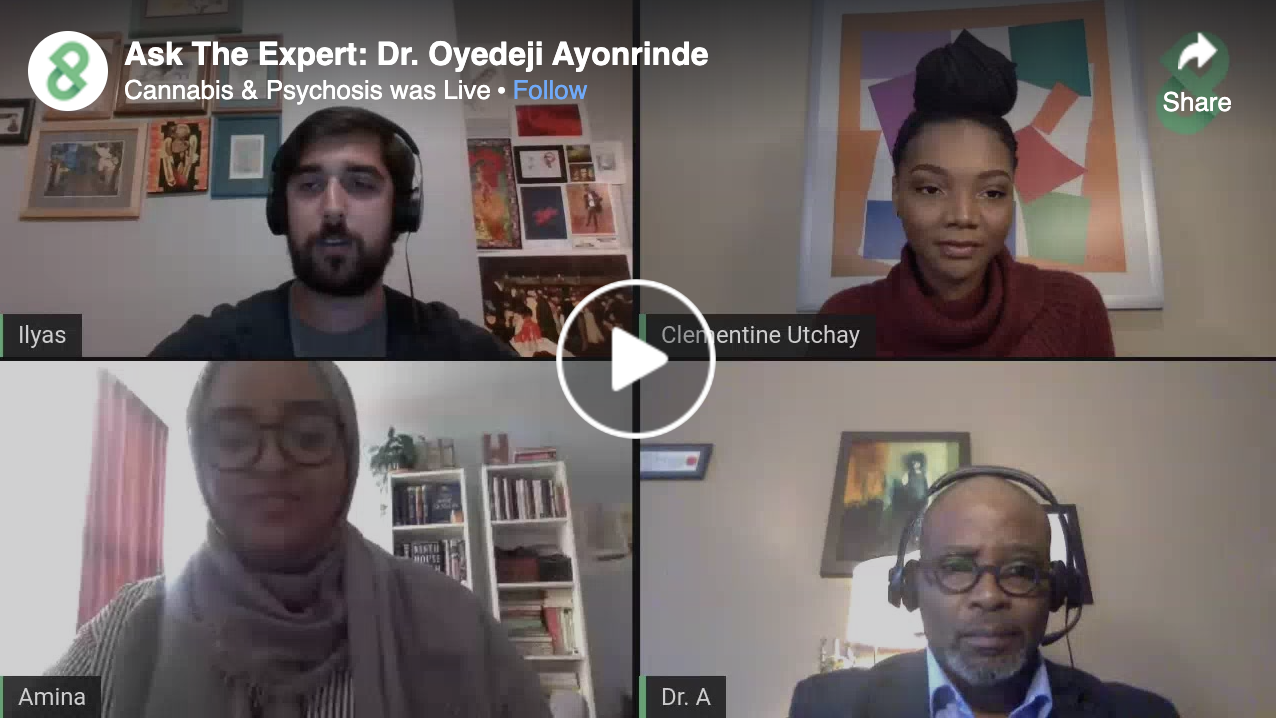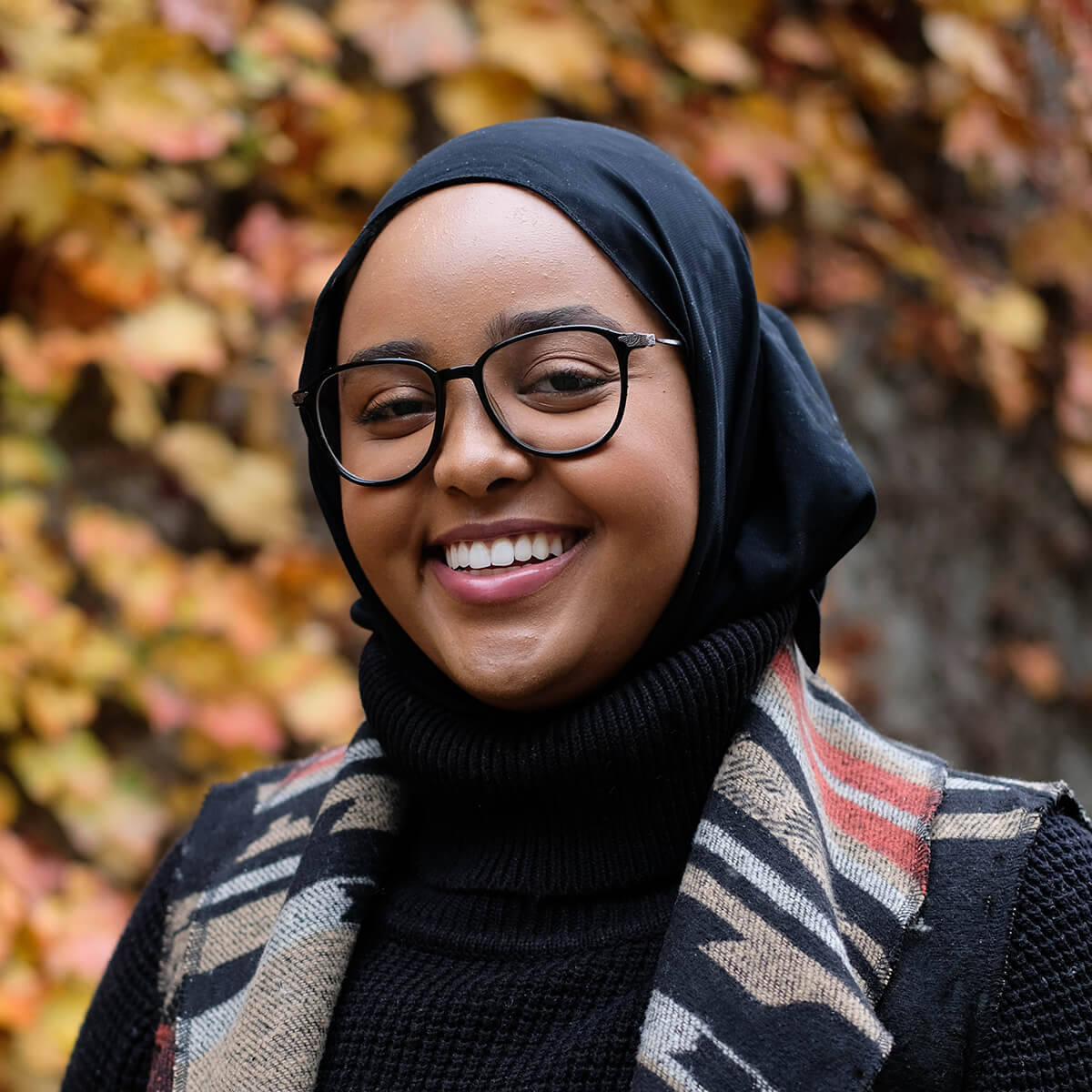COVID-19, Cannabis Use & Youth: Four Key Considerations
On June 1, 2020, Cannabis and Psychosis: Exploring the Link launched its inaugural “Ask the Expert” series in partnership with YouthREX. Clementine Utchay and Amina Hagar, both Research Assistants at YouthREX, co-hosted the webinar.
Earlier this month I co-hosted the launch of Cannabis and Psychosis: Exploring the Link’s online discussion series, “Ask the Expert”. The event was a one-hour, youth-led conversation between Ilyas Khamis (a representative from the Exploring the Link program), YouthREX Research Assistant Clementine Utchay, and cannabis expert and Professor of Psychiatry, Dr. Oyedeji (Deji) Ayonrinde.
The online event hoped to offer insight as to how COVID-19 impacts cannabis use, and the audience had an opportunity to ask questions and address guests directly via the live chat feature on YouTube and Facebook. The event attracted a diverse audience, from youth with questions about cannabis use to concerned parents and medical professionals seeking to expand their knowledge.
I was first introduced to Dr. Ayonrinde’s work when I completed Cannabis and Youth: A Certificate for Youth Workers last year. Since the legalization of cannabis, then, I’ve been working to expand my cannabis literacy to destigmatize the substance and understand how it affects youth in various communities.
Dr. Ayonrinde shared his knowledge during the event, and he expanded on various issues and concerns raised by audience members. Issues ranged from increased cannabis use during social isolation to concerns about potency levels in cannabis-infused THC edibles (THC, or tetrahydrocannabinol, gives users the feeling of being high) and vaporizable concentrates. Concerned parents were also looking for advice to support youth who may be exhibiting signs of cannabis dependency.
Towards the end of the event, Dr. Ayonrinde stated that the way to increase awareness and support youth is by involving youth –“nothing about youth without youth” – and to expand cannabis literacy and remove stigma associated with the disorder.
There were four key considerations that came up throughout the discussion:
1. Increased Cannabis Use During Social Isolation
Social isolation, a global lockdown, the threat of a contagious virus, and resulting anxieties have increased cannabis use. A theme throughout the discussion was the impact that COVID-19 has on people’s mental health, and the ways that cannabis might be helping youth cope; one of the statements shared by a young person was, “I wish more people know how much it helps at times like this.” In Canada, there have been reports of increased cannabis purchases; some people may use cannabis to help them sleep better, others may consume several joints a day to cope with this new reality or with the additional stress put upon interpersonal relationships. Dr. Ayonrinde discussed how using cannabis to cope can possibly increase the risk of paranoia and worsen mental health.
When he shared his experience with patients, Dr. Ayonrinde explained that some have reverted back to old cannabis dependency habits or are using cannabis to calm their anxiety about the pandemic. Cannabis dependency can increase based on the anxieties and lack of structure brought on by the virus, making it difficult to stop smoking when someone does not have something to do or anywhere to go.
2. Cannabis-Infused Psychosis
Audience members raised concerns about cannabis-infused edibles; one asked if edibles trigger psychosis. According to Dr. Ayonrinde, cannabis-infused THC edibles directly affect the brain, slowing the release rate into the body. Since edibles include sweets, pastries, and other food items, more cannabis is easily consumed in a short period of time, making it more potent than smoking. Cannabis consumed in this way can metabolize in the system for four to six weeks, possibly triggering psychosis if it’s consumed in a high dose and frequently, especially if the person is vulnerable or has family history. Of course, not everyone who consumes edibles will develop psychosis. If someone has a parent or sibling who has suffered from psychosis as a result of heavy cannabis use, the likelihood of psychosis can be increased. But because environmental factors such as ongoing trauma, bullying or other life events may also trigger psychosis, Dr. Ayonrinde warns heavy and/or frequent cannabis use might not be worth the gamble on the developing brain.
3. Discussing Cannabis Use with Youth
It can be difficult for some parents to tell if a young person’s use might be getting problematic, since social and recreational use is widely accepted, and use has increased during the pandemic. One concerned parent asked Dr. Ayonrinde about how to engage in difficult conversations surrounding cannabis. He provided several tips parents should use when speaking to youth, the first being to allow sufficient dialogue to understand why the young person is using. If they use to cope with stress or any other issues in their lives, and it affects them academically or socially, then it might be an indicator of cannabis use disorder or problematic use. Dr. Ayonrinde encouraged parents to enhance their cannabis literacy before they engage youth, and to develop a trusting dialogue when they discuss cannabis use with young people.
4. Mental Health Support and Co-Existing Health Issues
Mental health was a topic that was discussed during the event, and audience members wanted more information on cannabis use disorder and co-existing health issues, such as anxiety, and the resources available to support youth during this time. For some, cannabis use can relax, but for others it can worsen anxiety – for example, people with social anxiety disorder may have worsened symptoms or develop psychosis as a result of frequent cannabis use. When someone has one or more co-existing anxiety disorders, they should consult a family physician or contact youth mental health services.
Organizations such as the Schizophrenia Society of Canada and many frontline youth programs can help young people engage discreetly and provide stigma-free advice. It’s rare to see people seek help at the early intervention stages of cannabis use disorder – only 2% or 3% of people who experience problematic dependency or psychosis seek help. The majority of youth who seek help are either distressed about their symptoms or have found that cannabis has significantly impacted their lives (academically, socially or in terms of their work performance, for example).
Learn more about Cannabis and Youth: A Certificate for Youth Workers and access additional resources below, or in the Featured Collection on the Knowledge Hub.
ICYMI, read Clementine’s post from earlier this week on what we can learn from Exploring the Link about meaningful youth engagement!


